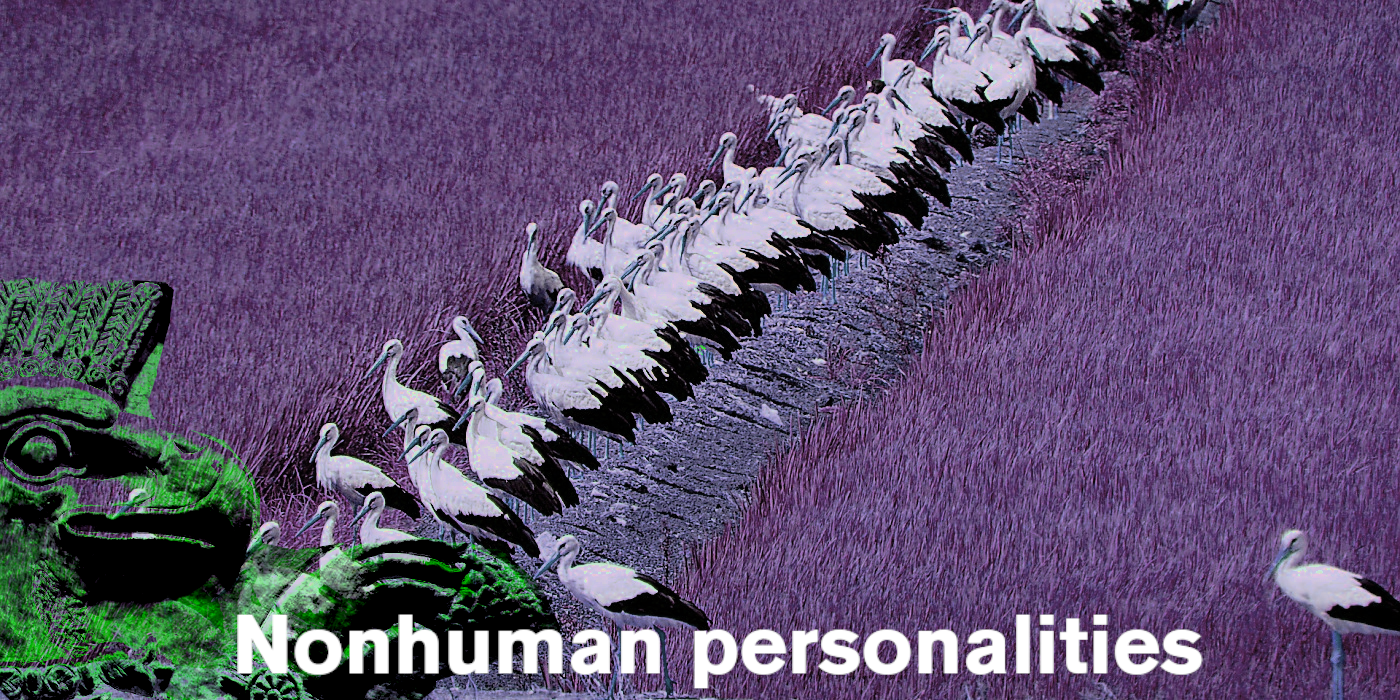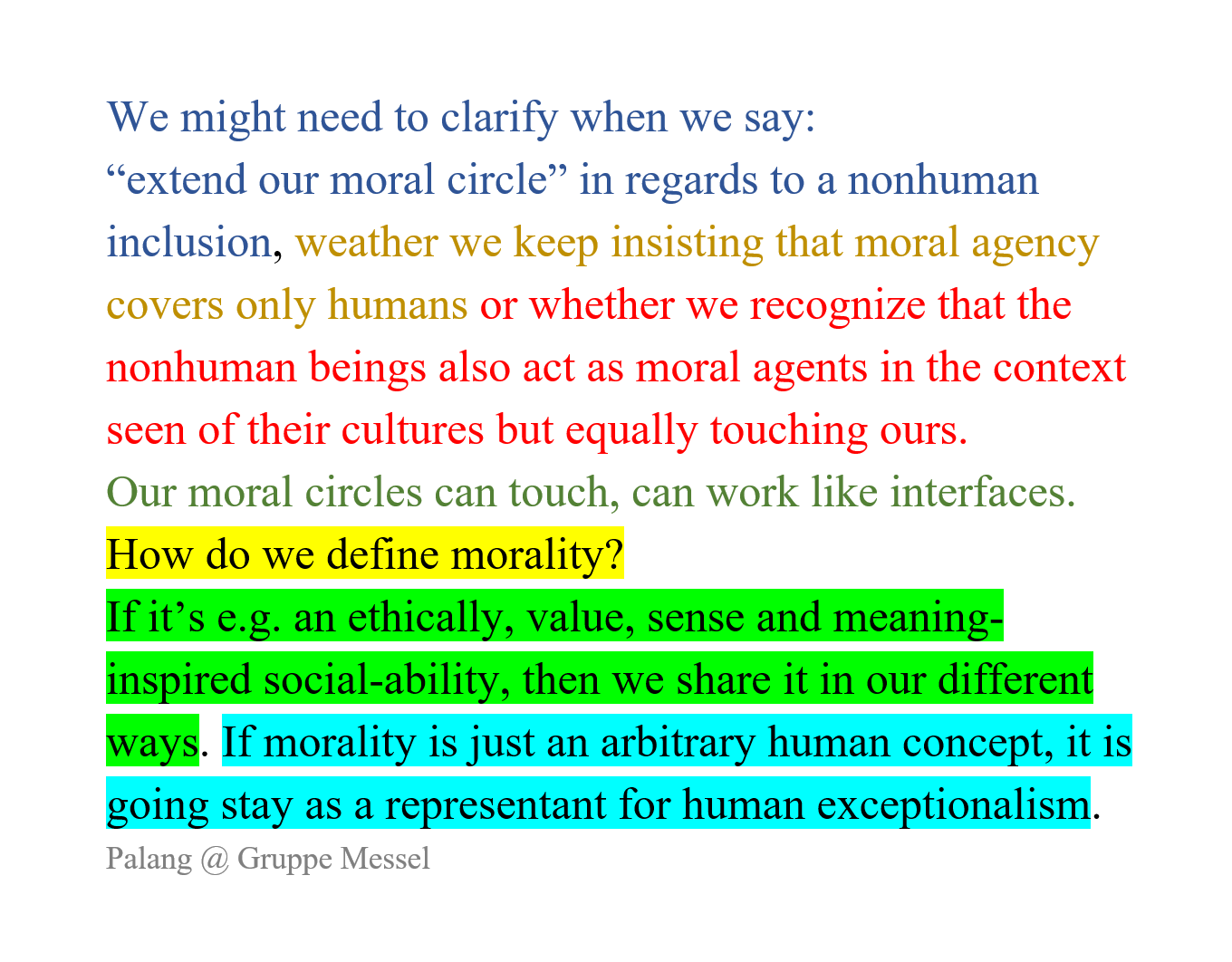

We might need to clarify when we say:
“extend our moral circle” in regards to a nonhuman inclusion, weather we keep insisting that moral agency covers only humans or whether we recognize that the nonhuman beings also act as moral agents in the context seen of their cultures but equally touching ours.
Our moral circles can touch, can work like interfaces. How do we define morality?
If it’s e.g. an ethically, value, sense and meaning-inspired social-ability, then we share it in our different ways. If morality is just an arbitrary human concept, it is going stay as a representant for human exceptionalism.
Palang @ Gruppe Messel
Category Archives: nonhuman rights / nonhuman cultures
“Homo sapiens” – systems of speciesism
“Homo sapiens” – systems of speciesism

What is it in people that makes zoocide and ecocide possible?
The assumption that only the “homo” is “sapient” (knowing) – as in the taxonomical classification of the Homo sapiens as the crown of creation by Carl von Linné / Carolus Linnaeus – expresses that nonhuman animal knowledge and the nonhuman living world is considered to be of lesser or no (relevant) type of knowledge (from a human perspective).
The human is assumed to be knowing, the nonhuman to be not knowing.
This type of thought enabled argumentations for massmurder on the biologistical basis.
Your effective activism is everything

Anything you think is reasonable to do for Animal-, Earth-and Human Rights is effective activism. Liberation work functions in all layers on all levels – also because that’s how dense oppressive structures and systems work. Uprooting deeply engrained injustices makes your individual power necessary all around.
Gruppe Messel, Tierautonomie / Animal Autonomy
No one wants to take responsibility for their speciesism

No one wants to take responsibility for their speciesism
not the religions, the religious
not the philosophies, the philosophers
not the natural sciences, the natural scientists …
when you when you ask them.
Respecting nonhuman autonomy, respecting nonhuman groups, individuals, cultures, ecologies … seems to be a matter of wilful and an out-of-nowhere-happening sort of empathical enlightenment? The distinct reasons for nonhuman oppression being rooted in our cultures and societies, in our histories thus, are simply being kept unadmitted, undisclosed.
Gruppe Messel, Tierautonomie / Animal Autonomy, specifics of speciesism: no one takes responsibilities
Specifics of speciesism: History, how we see “the past” and how we preserve “what is important”

Specifics of speciesism: History, how we see “the past” and how we preserve “what is important”.
Our collectively built historical consciousness, the legacies nonhuman-ignorant communities and collectives value:
- We relegate nonhuman animal history and nonhuman history in general into the natural-historic chapter of basically human history.
- We ignore nonhuman narratives; we ignore positions outside the anthropocentric dogma when they come from nonhuman perspectives, we haven’t developed any comprehension for nonhumanity on non-speciesist levels.
If we chose a nonhuman-inclusive mode of perception and developed accesses to nonhuman notions of ‘being-in-time and socio-cultural-contexts’ in their terms (…), we’d be able to phrase nonhuman perspectivity in our words, without referring to biology or other reductive explanatory segments into which animality has continuously been relegated.
Collective memories
- Museums, when they are about culture, thought, introspection, mental “wealth”, aesthetics: nonhumans are at best a means-to-an-end within these contexts, they are never represented as standing for their own complexity in broader nonhuman-inclusive historical contexts.
- History in itself is seen as a concept and experienced-phenomenon only conceivable by humans, and amongst humans themselves history is being selectively purported.
Memories of nonhumanity, from their and from nonhuman inclusive perspectivities, are being nullified, consciously conceived as irrelevant and mentally achieved within any of the manifold speciesist categories of human- or rather humanitycentered perceptions.
A superficiality problem

Problems of superficiality are still relatively prevalent in the current vegan movement
Why veganism is not an automatic remedy against social and political superficiality?
Social:
1. -isms prevail despite e.g. most prominently the reckognizable intersectionality discussion.
2. Levels of ‘internal’ and ‘external’ communication aren’t being (critically) reflected within the vegan mainstream.
3. The idea of veganism is not structurally improved in terms of nonhuman-inclusiveness, food-justice, classism, e.g.
Politically:
1. Veganism is segregated out of the context of why speciesism “turned” nonhuman animals into ressources and commodities in the first place, i.e. the ethical debate is not lead in these terms by a vegan rethoric.
2. Historical and cultural contextualizations with a vegan praxis aren’t evaluated and built in the collective consciousness and awareness of the movement. Change is being sought from within only roughly pronounced socio- and enviro-political relations, veganism as a player stays on one plane level due to reduced political contextualizations.
3. Closed clusterizations function like quasi-pluralistic selforganizing (hence also features of movement) – the created system remains closed in its own political mechanisms.

For no god and no ‘greater good’
Being food (poem)
Ever seen
being food
as specific
of speciesism
GM / specifics of speciesism


“If you are nobody,
and people think your personality
is to be fitted on a plate
If you think the unthinkable,
In all directions,
Their narrow frameworks
Never allow
They think you are nothing
Not bemourned
That’s what they do to
You my friends
My teachers
Nohuman Nonhumans
Animals.” – Person in Flesh
Basic antispe considerations
I scribbled this down for my friend hiesl @germanvegan, and we want to share these brief thoughts with everyone else …

Some basic radical antispe considerations about activities on a theoretical and practical plane
Theoretical / practical activities that help combat speciesism in the environment in your reach:
– Make being a radical antispeciesist part of your public and private personality.
– Use your possibilities to create safe-spaces for nonhuman individuals/life.
– Expect people to be able to think and reflect about social justice in a nonhuman-inclusive form.
– Use the internet e.g. or any place where you can express yourself to create postulations in order to forward radical antispeciesism – make your stance (this is also a form of self-empowerment).
– Learn weighing out positions, opinions, infos, sources, dynamics of communication via media: the AR movement isn’t a ‘clear spring’, it even harbors a lot of speciesism (like the biologistic one most often), animal-derogation, normalized speciesist-humansocieties-centered ‘megalomania’, etc. That is why the only safe way to navigate your activist field is to follow your own convictions that result from the ultimate experiences you gather together with the nonhuman contacts, friendships, relations you encounter. Animallib – or also respecting animal autonomy – aren’t empty words but should manifest in an actual antispeciesist praxis.
– “Common sense” – such as you apply in intra-human affairs – might be the best guide and the one that offers the most independent flexibility to learn and provide the freedom of thought you need.
Specifics of speciesism: aesthetics (fragment)

A nonhuman-inclusive critique of the view on aesthetics and speciesism on the current Animal Rights and Animal Liberation movements (fragment)
The Animal Rights discussion ends here:
- The missing discussion of specifics of nonhuman oppression, in its exact manifestations as humiliation, degradation, negation, violence is currently a hinderance of further development in the political efficacy of the “Animal Rights movement”.
- The discussion is omitted in sectors that deal with
- interrelated oppressive systems > how is it to be specifically “food” e.g.
- with Animal Liberation, which takes biologism uncriticized (as if not posing a problem with nonhumans, only for humans) > the entire layer of theories are not “liberated”
- in the Human-Animal-Studies sector which so far seems to a.) separate between the quality of human versus nonhuman oppression and b.) does not contextualize with environmental ethics due to a seperative focus on nonhuman animals and humans > academic adherence creates insufficient epistemologies
- Contextualizing animality within the broadest possible fields seems to be necessary, in order to create an adequacy in perspective on sociological, ecological, philosophical e.g. parameters and qualificators of the nonhuman situation as faced with speciesist oppression.
Specifics of oppression in speciesism: I am taking aesthetics as this is the most overlooked field of problem within the Animal Rights movement considering the powerfulness aesthetics hold in human societies and the specifics of speciesism and aesthetics as an oppressive tool.
- Aesthetics in arts is one way in which animal degradation takes form. In which ways does this occur?
- The exact ‘speciality’ of speciesist and/or nonhuman derogative aesthetics can be observed.
- What makes up aesthetics in its cultural function overall. The central roles have to be considered which wilfulness (Willkür), taste/preference (Geschmack, Präferenz), mode (Machart), subjectiveness play.
- “Thinking experiences” (Denkerfahrungen) of nonhumanity must be taken into account > multiplication with the perspectives of nonhuman others on the basis of e.g. the shared fact of individual existence and individuality – leaving difference and don’t require sameness (this is my posulation), yet locate “life” in “one world” (…).
- If we exclude nonhumanness again from all possibilities of angles of narration and narrative, we keep on repeating and perpetuating the initial species-denouncing act.

